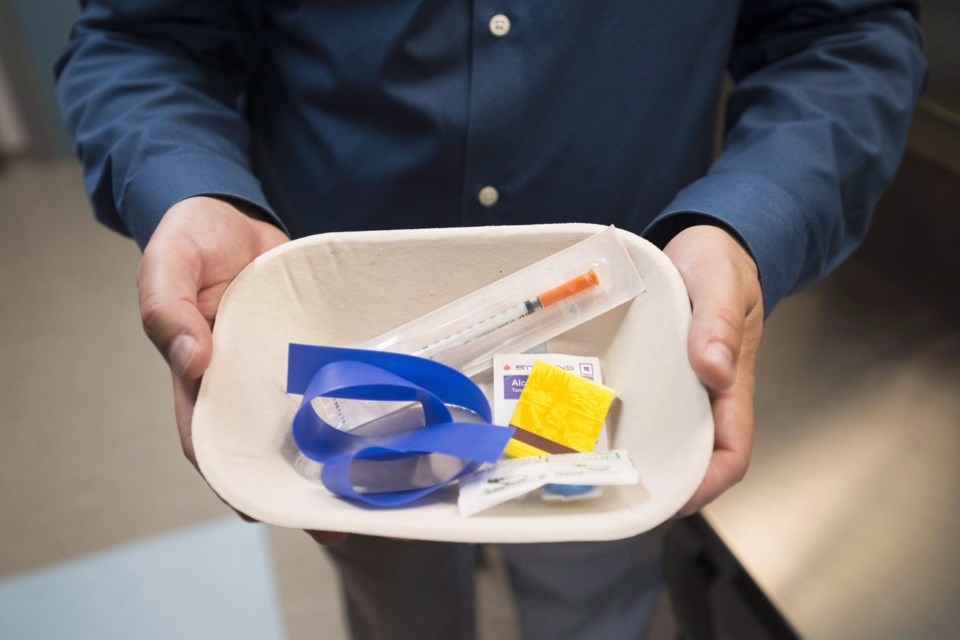Attempts by doctors to set up overdose prevention sites on hospital property in Nanaimo and Victoria were shut down Monday by the Island health authority, forcing the volunteers to move their operations across the street.
Doctors and other volunteers tried to set up sites on the grounds of Nanaimo General and Royal Jubilee hospitals over frustration that the B.C. government hasn't lived up to its promise to set aside space for overdose prevention at the health-care facilities.
Dr. Jess Wilder, an addictions and family medicine practitioner in Nanaimo, said her work has been mired in "controversy and politicization" lately, and the prevention sites are "about saving lives."
She said volunteers in Nanaimo were met by police and hospital security who told organizers they weren't allowed on hospital grounds and could be physically removed and arrested for trespassing.
Wilder said volunteers then established the overdose prevention site across the street from the hospital.
Dr. R茅ka Gustafson, Island Health chief medical health officer, said in a statement Monday that the health authority "is focused on enhancing care and connecting people to health services wherever they are at in their journey, particularly in the face of the enduring toxic drug crisis."
"Ensuring the safety of our staff, medical staff, patients, volunteers and visitors is of paramount importance. Operating an unapproved clinical service or demonstration on Island Health property cannot be supported, the statement said. "That is why our protection services teams worked respectfully with organizers to ensure their planned activities did not occur on Island Health property."
Wilder said the B.C. government pledged to open sites at every hospital in the province back in April, but those never materialized and she and other health care professionals have put up their own time and money to run the "pop-up" sites throughout the week.
She said the country is in the middle of the biggest public health crisis it has ever seen, and the B.C. government has had a ministerial order that dictates that "overdose prevention sites can and should, and must be set up in any place where they are needed."
Wilder says that seeing patients needlessly die has caused doctors much "moral distress," while politicians have seized upon addictions services with harmful narratives and expert voices like hers have been sidelined.
Wilder said a candidate in the last provincial election posted a TikTok video opposing a harm reduction vending machine at a hospital, and it was removed days later.
"We have been fighting for interventions like that, for such a simple thing as a machine that can give somebody a condom or a clean needle, if they're going to do the harmful thing anyway," Wilder said.
"We've been fighting for that for years and the fact that somebody who has no medical expertise can post a video on social media and have that be more impactful on the services that I'm able to provide my patients than anything that I've been doing for years is pretty devastating."
Dr. Ryan Herriot, who has a family and addictions medicine practice in Victoria, said they're setting up the sites on the day the new B.C. government is being sworn-in, and during the week that welfare recipients get their cheques.
Herriot said the day people get their cheques "is the most lethal day every month," for drug users, and he said dissatisfaction among people in his field has been "percolating slowly."
"A decision was taken that, you know, we need to put our voices in the public sphere," Herriot said. "I think what's happened over the last couple of years is experts have been reticent to speak out, to kind of step out of their clinical role and that has allowed non-experts to fill that void unfortunately."
The organizers of the sites are part of a group called Doctors for Safer Drug Policy, and Herriot said they "plan to be a physician voice for harm reduction, particularly in British Columbia, but maybe even beyond."
He said experts have been "complacent" and too "disengaged from the public conversation" around harm reduction and drug policy.
Herriot, Wilder and other volunteers plan to run the prevention sites through this week.
This report by The Canadian Press was first published Nov. 18, 2024.
Darryl Greer, The Canadian Press




